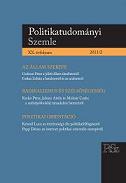A szélsőjobboldal iránti társadalmi kereslet növekedése Magyarországon
The Rise of the Social Demand for Right-wing Extremism in Hungary Political Capital
Author(s): Csaba Molnár, Attila Juhász, Péter KrekóSubject(s): Politics / Political Sciences
Published by: MTA Politikai Tudományi Intézete
Keywords: far-right; demand side; Jobbik; anti-establishment attitudes; prejudices
Summary/Abstract: Institute’s Demand for Right-Wing Extremism Index (DEREX) elaborated on the representative international database of the European Social Survey reveals that the percentage of respondents who are receptive to antiestablishment, chauvinistic, xenophobic, and authoritarian ideologies of the radical right was on the rise between 2002 and 2009 in Hungary. The rise in demand could have contributed to the resurgence of the institutional far right in Hungary. In Hungary, the rate of respondents who are psychologically receptive to the ideologies of the radical right (the potential right-wing extremists) emerged from 10 per cent to 21 per cent in the examined period, which is a dramatic and almost unprecedented increase in Europe. The rise can be mainly attributed to the increasing level of anti-establishment attitudes and prejudices, and we can see a moderate upsurge in fear and pessimism. At the same time, there hasn’t been any shift in the Hungarian society towards a more traditionalist and a more religious position. While we are focusing on the tendencies on the demand side in this study, we do not assume that the resurgence of the far right could be explained by this only factor. The reasons behind this phenomenon can be fully revealed just if we take into consideration the supply and the demand side factors, as well as the characteristics of the political environment at the same time.
Journal: Politikatudományi Szemle
- Issue Year: 2011
- Issue No: 2
- Page Range: 53-82
- Page Count: 30
- Language: Hungarian

